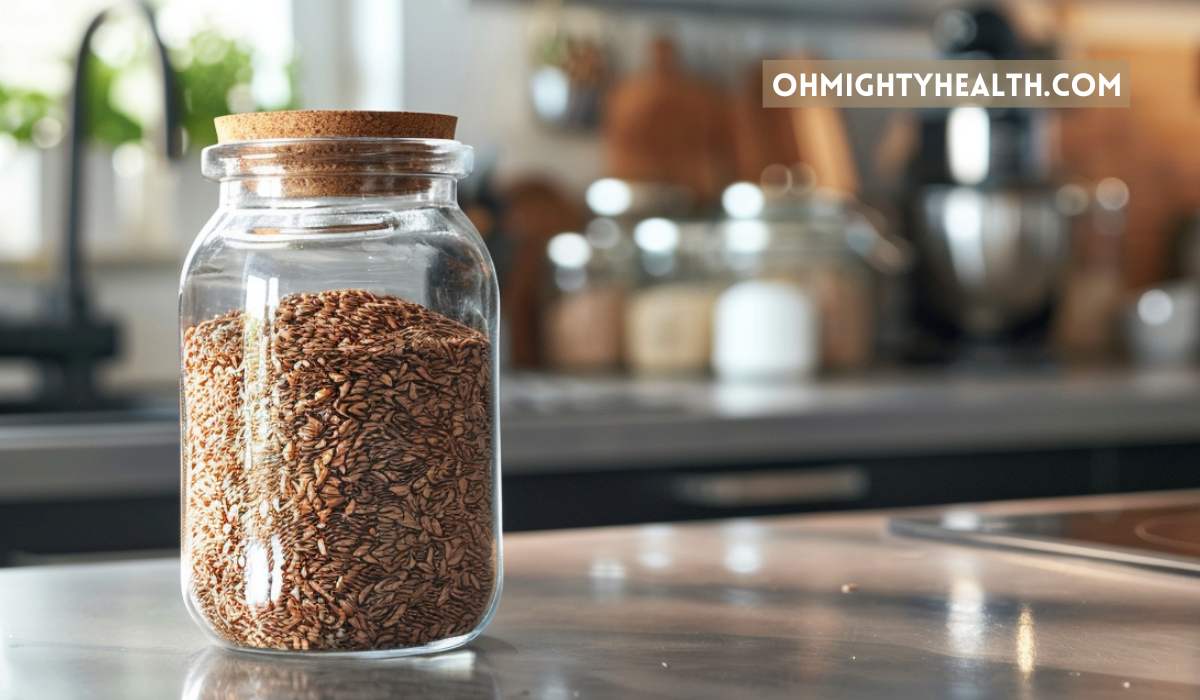Flaxseed: an Overview
Flaxseeds, from the plant Linum usitatissimumm, are rich in dietary fibre and omega-3 fatty acids, particularly alpha-linolenic acid. They also contain phytoestrogens called lignans.
The fibre primarily in the seed coat can help you feel full and reduce cholesterol absorption.
These seeds are used to aid constipation, diabetes, high cholesterol, obesity, and kidney swelling in lupus patients1. Although they’re claimed to have more benefits, scientific evidence for these is limited.
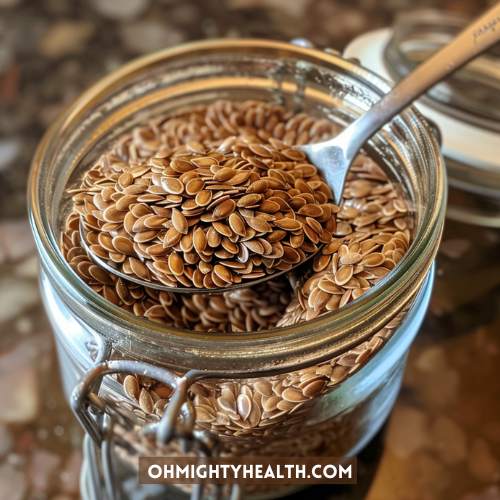
Flaxseed possible health benefits, backed by science
Incorporating flaxseeds into your diet could make a real difference in managing certain health conditions. Here’s a more detailed article on flax seed benefits. If you were assigned female at birth, this article on flaxseed benefits for women might interest you.
- Constipation: As seen above, flaxseeds are a fantastic source of dietary fibre. Adding them to muffins or meals can boost bowel movements, especially in young adults and those with diabetes.
- Diabetes: Consuming flaxseeds may slightly enhance blood sugar control for individuals with type 2 diabetes. The most benefits come from ground flaxseeds and consistent use over 12 weeks.
- High cholesterol: Flaxseeds taken orally can reduce total and LDL cholesterol levels, particularly in people with high cholesterol or who are overweight. However, their effect on triglyceride and HDL cholesterol levels is less clear.
- High blood pressure: Flaxseeds may modestly lower blood pressure in people suffering from hypertension.
- Breast pain (mastalgia): A daily flaxseed muffin for 3 months or flaxseed powder for 2 months can alleviate breast pain associated with the menstrual cycle.
- Obesity: Flaxseeds might aid in reducing body weight, BMI, and waist circumference in overweight or obese individuals. The best results are seen with at least 30 grams daily for 12 weeks. While flaxseed mucilage has shown promise in weight loss, flaxseed lignan extract has not.
- Kidney swelling in lupus: For those with lupus, consuming whole or ground flaxseeds can improve kidney function.
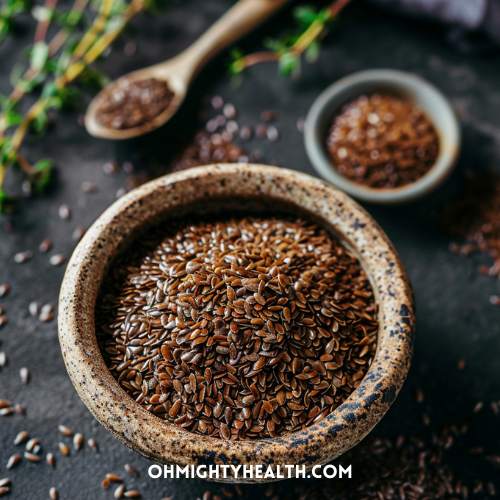
These insights reflect the power of flaxseeds in addressing a variety of health issues, making them a valuable addition to a health-conscious diet.
Difference between flaxseed and flaxseed oil
As a health coach, I like people to learn the differences between formats when it comes to natural ingredients.
For example, the difference between flaxseeds and flaxseed oil is important. Each has its unique health advantages, so choosing between them depends on your specific nutritional needs.
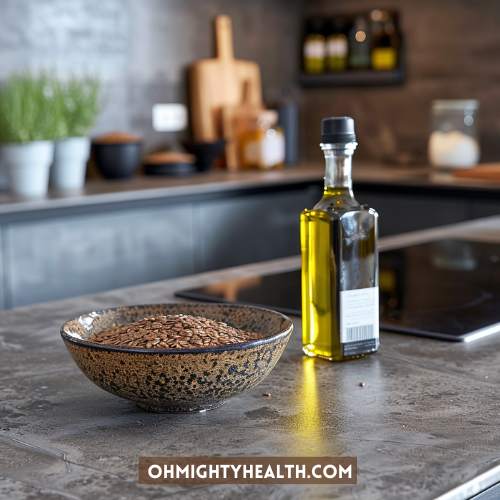
Nutritional content
Flaxseeds
Flaxseeds contain a broad range of nutrients, including dietary fibre, lignans, and protein, in addition to omega-3 fatty acids.
Flaxseed oil
Flaxseed oil, on the other hand, is primarily a source of omega-3 fatty acids, specifically alpha-linolenic acid (ALA), and does not contain the fibre or lignans found in the whole or ground seeds.
Health benefits
- Fibre and digestive health: The fibre in flaxseeds can help in digestion and prevent constipation, but flaxseed oil does not contain fibre.
- Lignans and antioxidant effects: Flaxseeds are a rich source of lignans, which have antioxidant properties and can mimic estrogen in the body, potentially offering benefits like reducing the risk of certain cancers. Flaxseed oil contains little to no lignans unless they are specifically added back into the oil.
- Omega-3 fatty acids and heart health: Both flaxseeds and flaxseed oil provide omega-3 fatty acids, which are beneficial for heart health. However, flaxseed oil is a more concentrated source of ALA than whole flaxseeds.
Flaxseeds can be consumed whole (though they are better absorbed when ground), added to foods for nutritional enhancement, and used for their fibre content. Flaxseed oil is often used as a dietary supplement or a salad dressing and is not suitable for cooking at high temperatures due to its low smoke point.
What are the possible side effects of flaxseed?
Generally speaking, flaxseeds are a safe and beneficial addition for most adults.
However, like with any dietary change, there are a few things to be mindful of.
When you start adding flaxseeds to your meals, you might notice an uptick in your daily bowel movements. This is actually a good sign in many cases, indicating that your body is responding to the increased fibre.
Yet, it’s not uncommon for some to experience bloating, stomach pain, nausea, or gas as their body adjusts to this new fibre source.
These side effects are usually temporary and can often be mitigated by adjusting the amount you consume.
This is why I always advise starting with a small amount and gradually increasing it, allowing your body to adjust slowly.
Incorporating flaxseeds into your diet should be a balanced and mindful process. Listening to your body and adjusting your intake accordingly can help you enjoy the benefits of flaxseeds without discomfort. Remember, everyone’s body reacts differently, so finding your own sweet spot is key.
How to enjoy flaxseed
- Ground: Sprinkle them on cereal, yoghurt, oatmeal and salads, or add them to baked goods like muffins, bread, and pancakes. Read on ways to eat flaxseed.
- Oil: Use it for salad dressings or drizzling over the cooked vegetables.
- Flaxseed meal: Use it as a binding agent in veggie burgers or add it to smoothies.
Beware of flaxseed going rancid, as this not only affects its nutritional value but can also introduce harmful compounds into your diet.
Always store flaxseed in a cool, dark place and consider refrigerating them to extend their shelf life and preserve their health benefits.
Whole flaxseed vs ground flaxseed vs flaxseed meal
Whether you’re going for whole, ground, or meal, flaxseeds are a versatile and nutritious choice to add to your diet. If you are specifically looking to make the most of their benefits for weight loss, here’s a helpful article: how to eat flaxseed for weight loss.
Whole flaxseed
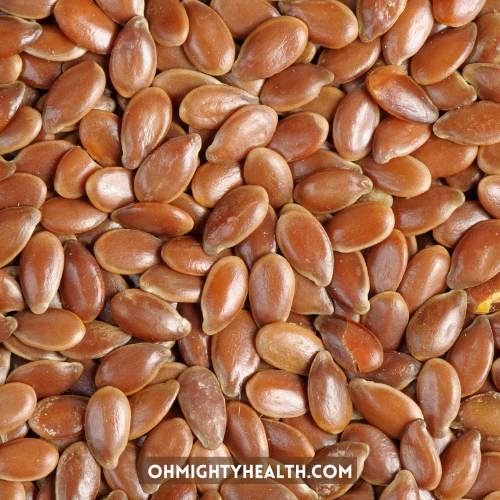
Whole flaxseed are like an all-rounder of nutrition. Easy to sprinkle on top of your breakfast or salads for a crunchy texture. However, keep in mind that our bodies might not fully break them down, which means we could miss out on some of their nutritional benefits.
Ground flaxseed
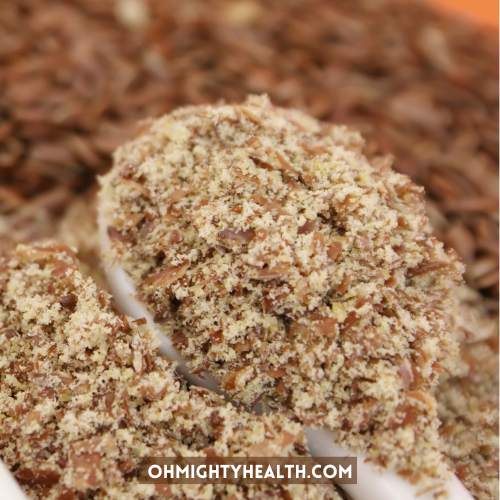
Ground flaxseeds, on the other hand, are ready to deliver all their goodness directly. Grinding them helps our bodies absorb those fantastic nutrients, especially the Omega-3 fatty acids and fibre. It’s my go-to when I want to make sure I’m getting all the health perks. Here’s the ultimate guide on grinding flaxseed.
Flaxseed meal
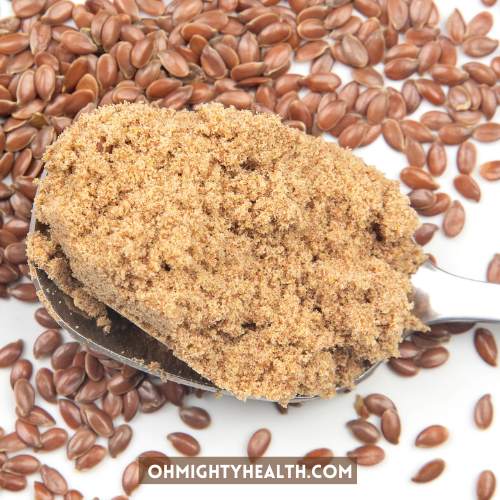
Flaxseed meal is essentially ground flaxseeds but might be a bit finer. You can use it for baking, thickening up your smoothies, or even as an egg substitute in recipes for a nutritional boost.
Will you give them a go?
It is clear these tiny seeds pack a mighty punch in terms of health benefits.
From aiding digestion and improving heart health to potentially reducing the risk of certain chronic diseases, flaxseeds are a superfood worth incorporating into your diet.
Whether you go for whole, ground, oil or flaxseed meal, each form offers unique advantages that can fit into various aspects of your eating habits.
As a health coach, I’m dedicated to continuously improving my own health and that of others through the use of natural ingredients, with flaxseed being a key component of the wellness journey.
I encourage you to explore and find creative ways to include them in your meals.
Remember, the journey to better health is all about making informed choices and listening to your body.
Flaxseeds might just be the nutritional boost you’ve been looking for.
Give them a try and feel the difference for yourself!

